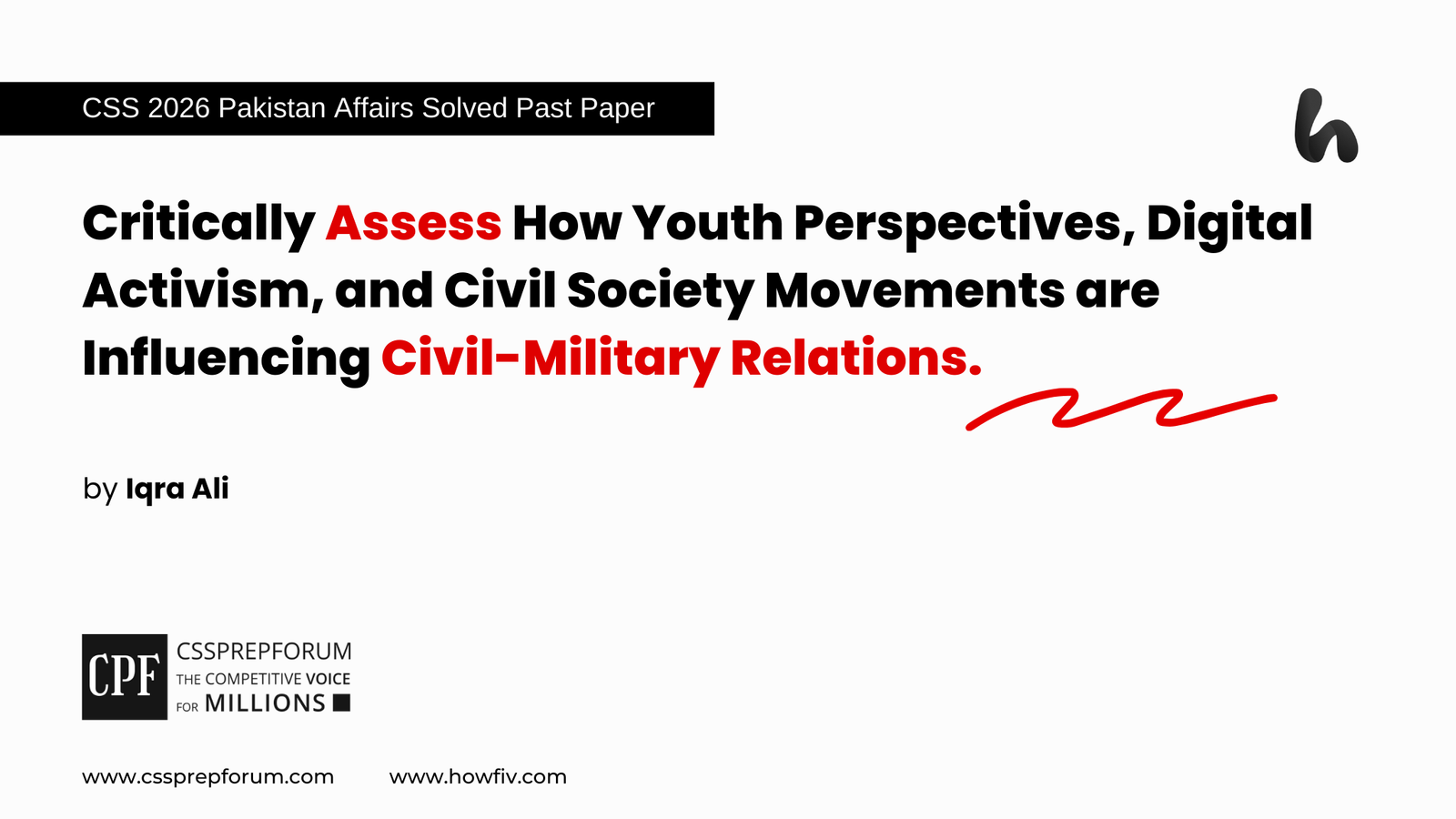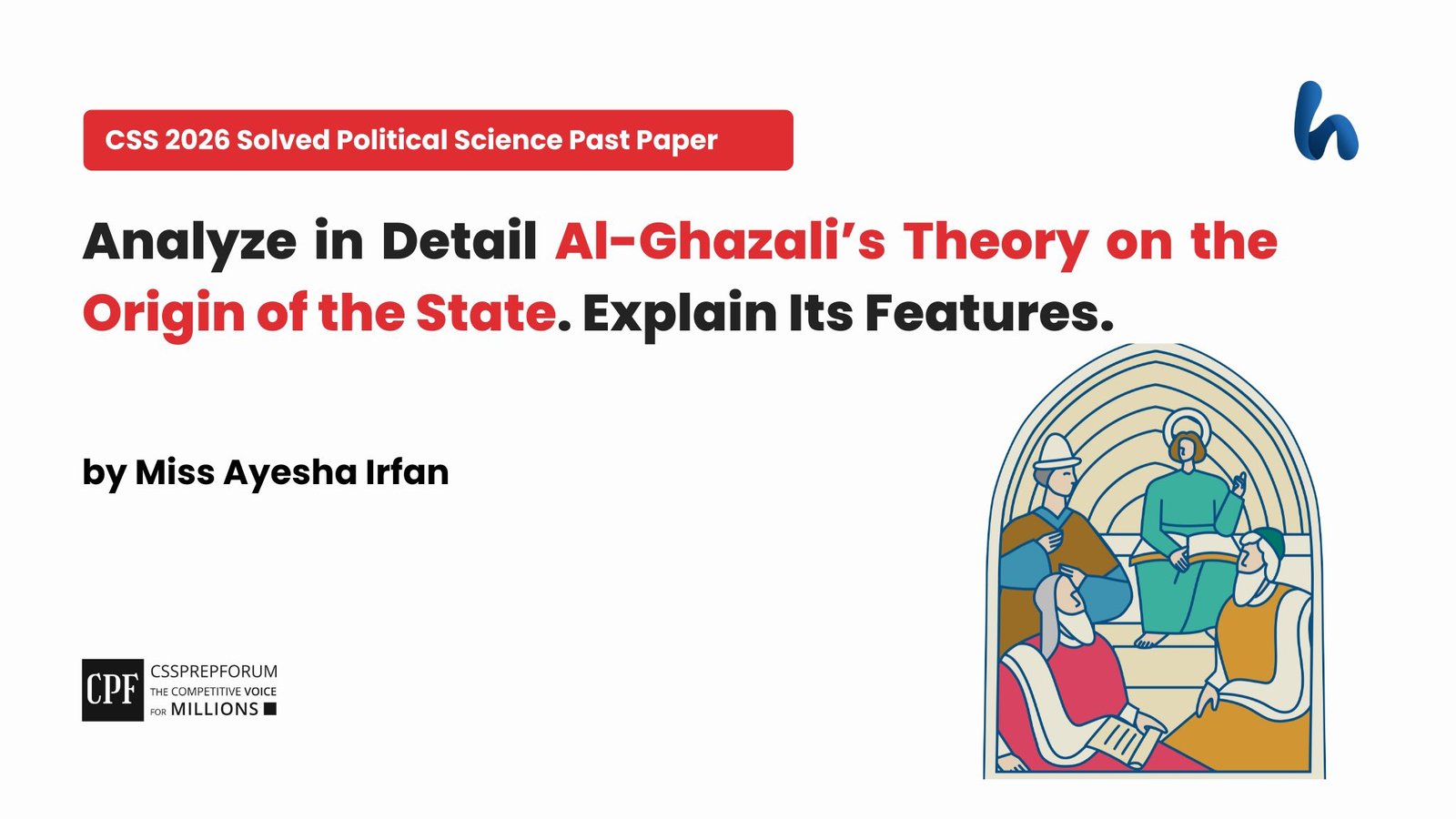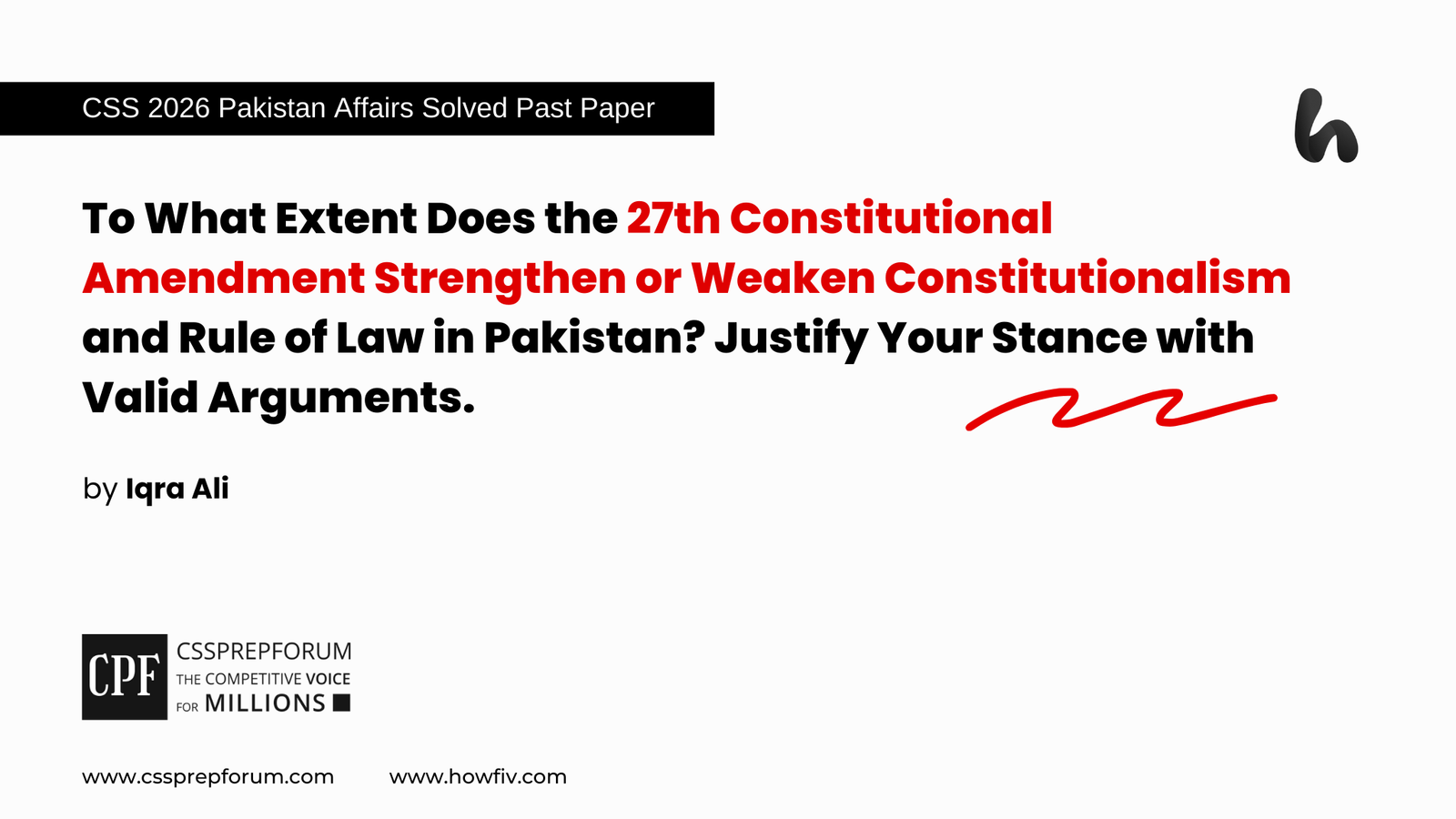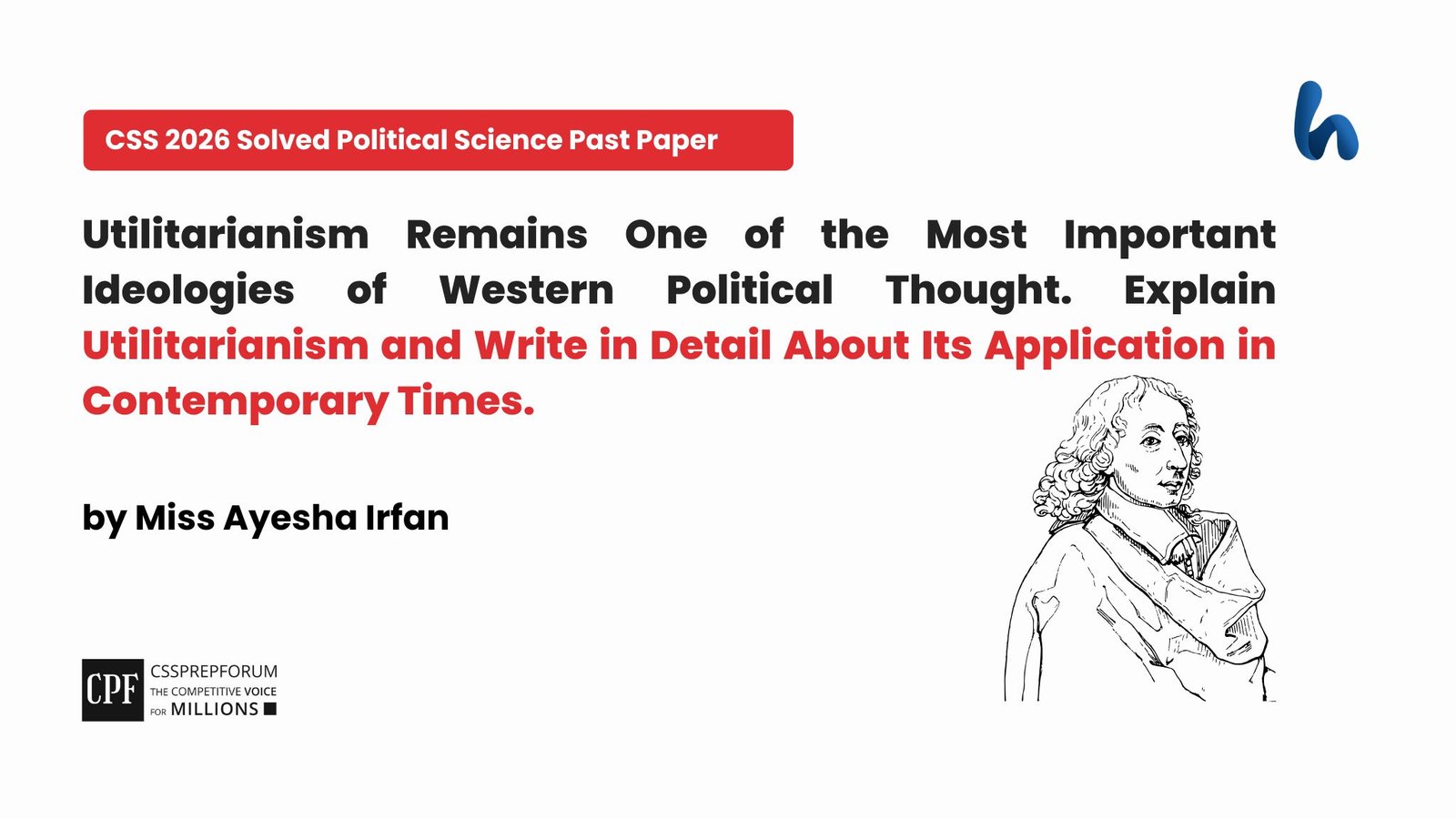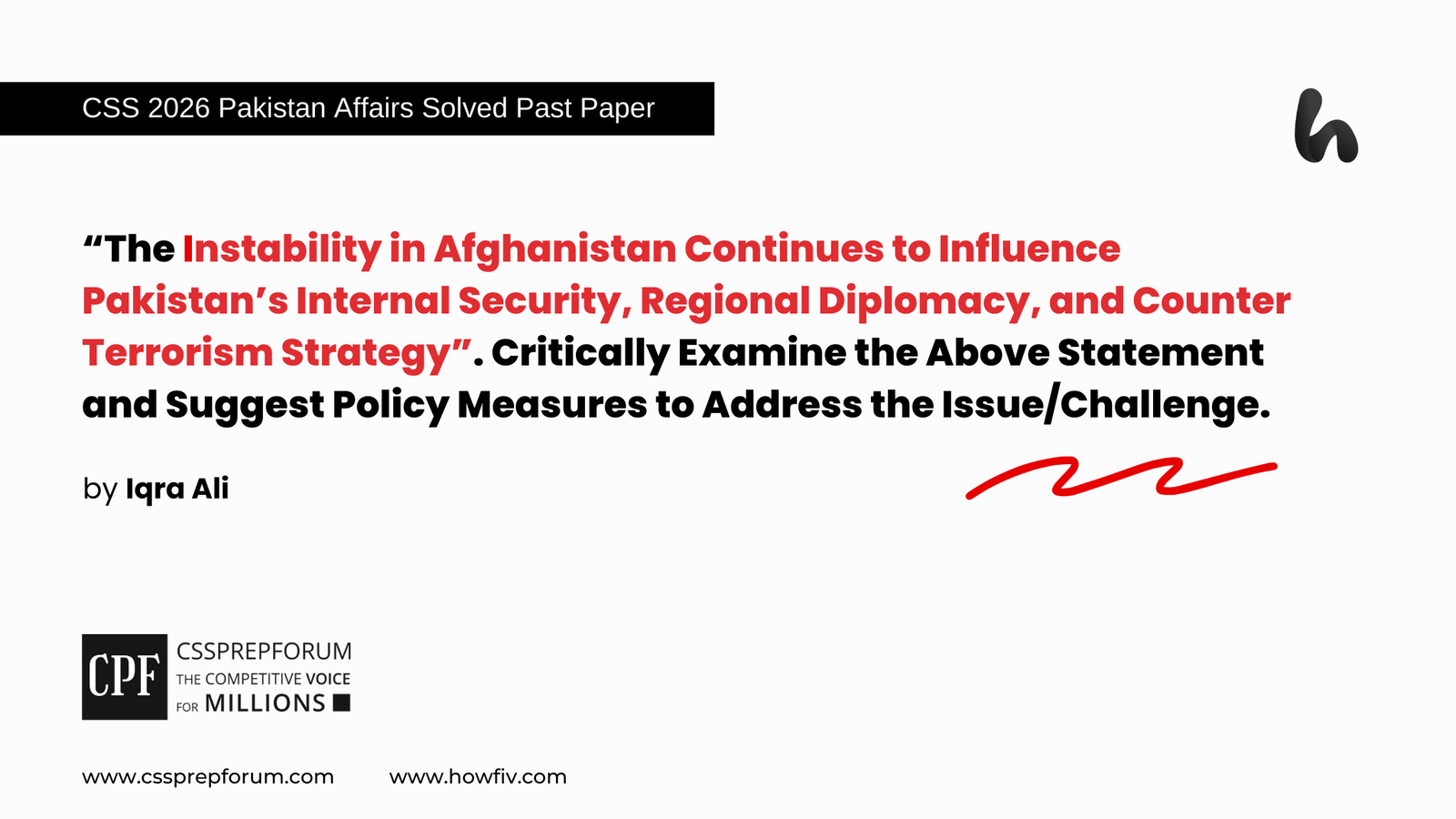CSS 2025 Solved Islamiat Past Papers | The Views in Today’s Muslim Circles about Western Civilization
The following question of CSS Islamiat 2025 is solved by Miss Ayesha Irfan, the highest scorer in CSS Islamiat. Moreover, the question is attempted using the same pattern taught by Sir Syed Kazim Ali to his students, who have scored the highest marks in compulsory subjects for years. This solved past paper question is uploaded to help aspirants understand how to crack a topic or question, write relevantly, what coherence is, and how to include and connect ideas, opinions, and suggestions to score the maximum.

Question Breakdown
The examiner inquired about the Views Found in Today’s Muslim Circles about Western Civilization. The question is addressed in two parts. The first is an outline, which is broken down into different parts. Moving further, the introduction is given, followed by how the Views are Found in Today’s Muslim Circles about Western Civilization, an analysis of the critical assessment of these views, and the conclusion.
Outline
1-Introduction
2-Understanding ‘Western Civilization’ and its Key Features
3-Identifying and Analyzing Views of Today’s Muslim Circles about Western Civilization
A-Favorable Views
- Scientific and Technological Advancements
- Democratic Values and Human Rights
- Economic and Educational Opportunities
B-Critical Views
- Secularization and Weakening of Islamic Values
- Cultural Invasion and Moral and Intellectual Decline
- Denouncing for Colonial Mindset
- Economic Exploitation and Dependency
- Islamophobia, Loss of Identity and Colonial Legacy
4-Analysing critical assessment of these views
- The Challenge of Cultural and Religious Identity
- Political and Economic Dependency vs. Self-Sufficiency
- The Role of Media and Global Narratives
5-Conclusion

Answer to the Question
Introduction
Western civilisation has dramatically impacted the modern world and shaped political structures, economic systems, technological advancements, and cultural ideals. Views of Western civilization in Muslim communities range considerably from awe to distrust and open rejection. Some argue for the selective adoption of its innovations because they see it as a model of development, especially in the areas of science, technology, and government. Others condemn it for encouraging moral decay, secularism, and political meddling in Muslim countries. Integrating positive elements while maintaining Islamic identity is necessary for a more balanced viewpoint. This essay examines these various points of view and evaluates their significance for Muslim cultures in the age of globalization.

Understanding ‘Western Civilization’ and its Key Features
Western civilization describes the intellectual, political, and cultural traditions that have influenced most of the contemporary world and are rooted in Europe. Secularism, democracy, capitalism, individualism, scientific advancement, and human rights are its defining characteristics. Western culture, which has its roots in the Enlightenment and the Industrial Revolution, strongly emphasises free markets, innovation in technology, and reason. Its focus on secular ideals frequently contradicts Islamic teachings even though it has helped improve economic growth, governance, and education. Assessing its impact on Muslim cultures and the range of responses it elicits within them requires understanding its salient characteristics.
Identifying and Analyzing Views of Today’s Muslim Circles about Western Civilization
A-Favorable Views
- ✔Scientific and Technological Advancements
The perks of Western scientific and technical developments are acknowledged by a sizable segment of the Muslim world, especially in domains like information technology, engineering, and medicine. The World Intellectual Property Organization (WIPO) 2022 report states that Western nations account for more than 60% of patents and scientific research worldwide, impacting global technological advancement. To promote economic and educational progress, some countries with a majority of Muslims, like Malaysia, Turkey, and the United Arab Emirates, have aggressively incorporated these advances. To preserve cultural and religious identity, some academics contend that although embracing scientific advancement is crucial, it should also be consistent with Islamic moral and ethical principles.
- ✔Democratic Values and Human Rights
Furthermore, the principles of democracy and human rights, which are frequently linked to Western culture, are valued in many Muslim communities. Many Muslims believe that proper government requires adherence to ideals like individual freedom, legal equality, and political involvement. According to the Arab Barometer Survey (2021), nearly 72% of Middle East and North African respondents said they supported democracy because they thought it promoted accountability and progress. Similarly, Islamic teachings align with human rights frameworks that promote equality and justice. Nonetheless, some detractors contend that Western conceptions of democracy and human rights are frequently implemented selectively and can conflict with Islamic moral principles and governance models.
- ✔Economic and Educational Opportunities
Moreover, the economic and educational prospects linked to Western culture have been praised in many Muslim societies. Many Muslims value the cutting-edge research facilities, academic institutions, and financial models that have aided in the advancement of the world. Western nations are home to seven of the top ten economies and the majority of the world’s finest institutions, drawing thousands of students from Muslim-majority countries who are looking to further their education and advance their careers (World Bank, 2022). Furthermore, trade, investment, and innovation have created opportunities for economic development due to Western-driven globalization.
B-Critical Views
- ✔Secularization and Weakening of Islamic Values
First and foremost, many Muslims think secularization is fueled by Western civilization, which is causing Islamic principles to erode in society. Western influence is frequently blamed for the growing disentanglement of religion from politics, the law, and education in some nations with a majority of Muslims. In countries like Pakistan, Egypt, and Indonesia, a sizable portion of Muslims voice worries that Western secular ideologies prioritize consumerism, individualism, and moral deterioration over religion and familial values (Gallup Poll, 2021). A decrease in devotion to traditional Islamic traditions has also resulted from the spread of liberal lifestyles brought about by globalization and Western media. While modernization is necessary, critics contend that it shouldn’t come at the expense of undermining the firmly held Islamic values that define Muslim identity.
- ✔Cultural Invasion and Moral and Intellectual Decline
Moreover, many Muslims believe that Western culture is a source of cultural encroachment that jeopardizes basic Islamic principles and causes intellectual and moral decay. The pervasiveness of Western fashion, entertainment, and media has brought about lifestyles that are in opposition to Islamic values, encouraging consumerism, immodesty, and relativism in morality. Allama Iqbal, a visionary philosopher of the Muslim world, warned against the blind imitation of Western thought, arguing that it weakens the spiritual and intellectual strength of Muslims. In his book Reconstruction of Religious Thought in Islam, he criticized Western consumerism, saying it causes identity crises and separates people from their spiritual core. Furthermore, Islamic scholarship has been neglected due to the dominance of Western-centric educational institutions, which has damaged indigenous knowledge generation by fostering an intellectual reliance. Instead of being dominated by Western ideas, Iqbal stressed Muslims’ need to create their own autonomous intellectual and cultural framework based on Islamic principles. While contact with many cultures is unavoidable, critics contend that unchecked Western influence undermines Islamic identity, values, and intellectual legacy, leading to a crisis of self-perception in Muslim nations.
- ✔Denouncing for Colonial Mindset
In addition, Western civilization is criticized by many Muslims for encouraging a colonial mentality that still influences intellectual, political, and economic systems throughout the Muslim world. Allama Iqbal vehemently opposed this kind of thinking, contending that colonial power not only took advantage of Muslim territories but also created an inferiority mentality that caused many people to adopt Western values mindlessly. In his poetry, particularly in Bang-e-Dra and Bal-e-Jibril, he warned against the psychological subjugation of Muslims, emphasizing that actual progress lies in self-reliance and the revival of Islamic thought. Many Muslim-majority nations are still dominated by Western political influence, economic policies, and educational systems even after colonialism officially ended. Critics contend that this ongoing reliance stifles local knowledge systems and undermines independent government, perpetuating the notion that advancement can only be attained via Westernization. In response, Iqbal promoted spiritual and intellectual awakening, calling Muslims to recover their culture and create an educational and governmental structure based on Islamic principles rather than Western ones.
- ✔Economic Exploitation and Dependency
Furthermore, Western civilization is criticized by many Muslims for encouraging economic exploitation and reliance, which keeps Muslim countries dependent on Western financial systems. In its warning against economic injustice, the Qur’an says, “And do not consume one another’s wealth unjustly or send it [in bribery] to the rulers” (Al-Baqarah 2:188). Nonetheless, Numerous Muslim nations are in debt, and multinational firms take advantage of their resources without paying them fairly. These Western-dominated organizations include the World Bank and the IMF. Reliance on Western capitalism, according to critics, compromises Islamic economic tenets like interest-free banking and just income distribution. Muslims must adopt self-reliance and fair financial systems based on Islamic principles if they hope to reclaim economic independence.
- ✔Islamophobia, Loss of Identity and Colonial Legacy
Last but not least, many Muslims believe that colonial heritage, Islamophobia, and identity loss are lingering effects of Western culture that harm the Muslim world. The Qur’an cautions against embracing outside influences that undermine Islamic principles by stating, “And never will the Jews or the Christians approve of you until you follow their religion” (Al-Baqarah 2:120). Islamophobia has resulted in limitations on religious activities, discrimination, and unfavourable depictions of Muslims in Western society. Islamic identity is still being undermined by the Westernized legal, political, and educational institutions that many Muslim countries still have from their colonial history. Critics contend that Muslims’ faith in their ancestry is further undermined by this psychological and cultural enslavement, which makes them feel inferior to the West. As the Qur’an stresses, Muslims must fight this by reclaiming their religious, cultural, and intellectual identities: “In fact, the honour belongs to Allah, His Messenger, and the believers” (Al-Munafiqun 63:8).
Analyzing critical assessment of these views
- The Challenge of Cultural and Religious Identity
Moreover, many Muslims are still deeply troubled by the difficulty of preserving their cultural and religious identity in the face of Western influence. An identity crisis has resulted from the quick dissemination of Western ideals through globalization, education, and the media, especially among Muslim young. While some contend that interaction with Western culture promotes advancement, others think it causes Islamic customs to deteriorate. The Qur’an emphasizes the importance of preserving faith and identity, stating, “And do not incline toward those who do wrong, lest the Fire should touch you” (Hud 11:113). Modernization is vital, but slavishly copying Western standards might erode social cohesiveness and religious fervour. Thus, a balanced strategy is required to preserve a unique Muslim identity, embracing positive developments while respecting Islamic principles, beliefs, and customs.
- Political and Economic Dependency vs. Self-Sufficiency
Except all these, a significant hurdle for Muslim countries continues to be the conflict between the demand for self-sufficiency and political and economic reliance on the West. Many nations, frequently at the expense of their sovereignty, depend on Western nations for economic growth, financial assistance, and political stability. The Qur’an cautions against being overly reliant on others by saying, “And never will Allah give the disbelievers a way over the believers” (An-Nisa 4:141). Economic strategies enforced by Western-controlled organizations such as the World Bank and IMF frequently result in long-term debt and reliance rather than genuine progress. Critics stress the value of independence, while others contend that interaction with Western economies fosters prosperity. Thus, achieving self-sufficiency, as encouraged in Islam, is essential for restoring the dignity and strength of Muslim nations.
- The Role of Media and Global Narratives
In the last, the media and global narratives have had a significant impact on how people view Islam and Muslim cultures; they frequently reinforce stereotypes and sway public opinion in favour of Western ideals. Islamophobia is fueled by Western media’s frequent portrayal of Islam as associated with extremism, which also serves to defend military and political operations in Muslim nations. The Qur’an cautions against misrepresenting the truth by saying, “O you who have believed, if a corrupt person brings you news, investigate it, lest you harm a people out of ignorance and become regretful” (Al-Hujurat 49:6). Although the media may be a valuable instrument for raising awareness and educating people, its inaccurate portrayal frequently threatens Muslim identity and values. Critics contend that to combat false information, advance an accurate portrayal of Islam, and regain their position on the international scene, Muslim countries need to make investments in independent media outlets. To counter Western-dominated discourse, fortifying Islamic scholarship and internet presence is imperative.
Conclusion
In conclusion, opinions of Western civilization in Muslim communities are a mixture of praise and criticism, emphasizing its advantages and disadvantages. Opportunities are presented by developments in science, technology, and governance, yet worries about economic dependence, cultural deterioration, and secularization still exist. Adopting a balanced strategy that embraces advancement while preserving Islamic identity is the path ahead. Muslim countries must invest in independent media, robust educational systems based on Islamic principles, and self-sufficient economies. With the words, “Indeed, Allah will not change the condition of a people until they change what is in themselves” (Ar-Ra’d 13:11), the Qur’an highlights the need for self-reliance and exhorts Muslims to regain power.

CSS 2025 Solved Islamiat Paper
Searching for CSS or PMS Solved Islamiat Past Papers?
Are you preparing for CSS or PMS and searching for solved Islamiat past papers, notes, books, PDFs, and MCQs? Explore them for free on Howtests and Cssprepforum. All content is fully solved and written by Miss Ayesha Irfan. For your convenience, the links are provided below, simply click on any to start reading and preparing.


